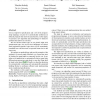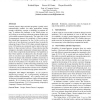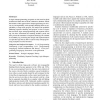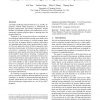OOPSLA
2010
Springer
13 years 3 months ago
2010
Springer
Heap Abstraction with Demand-Driven Axiomatization of Memory Invariants Isil Dillig Thomas Dillig Alex Aiken Stanford University lig Thomas Dillig Alex Aiken Symbolic Heap Abstract...
OOPSLA
2010
Springer
13 years 3 months ago
2010
Springer
Programming forums are becoming the primary tools for programmers to find answers for their programming problems. Our empirical study of popular programming forums shows that the...
OOPSLA
2010
Springer
13 years 3 months ago
2010
Springer
Software developers often duplicate source code to replicate functionality. This practice can hinder the maintenance of a software project: bugs may arise when two identical code ...
OOPSLA
2010
Springer
13 years 3 months ago
2010
Springer
Given a high-level specification and a low-level programming language, our goal is to automatically synthesize an efficient program that meets the specification. In this paper,...
OOPSLA
2010
Springer
13 years 3 months ago
2010
Springer
Type classes were originally developed in Haskell as a disciplined alternative to ad-hoc polymorphism. Type classes have been shown to provide a type-safe solution to important ch...
OOPSLA
2010
Springer
13 years 3 months ago
2010
Springer
The Java language lacks the important notions of ownership (an object owns its representation to prevent unwanted aliasing) and immutability (the division into mutable, immutable,...
OOPSLA
2010
Springer
13 years 3 months ago
2010
Springer
Heterogeneous multi-core processors, such as the IBM Cell processor, can deliver high performance. However, these processors are notoriously difficult to program: different cores...
OOPSLA
2010
Springer
13 years 3 months ago
2010
Springer
General purpose object-oriented programs typically aren’t embarrassingly parallel. For these applications, finding enough concurrency remains a challenge in program design. To ...
OOPSLA
2010
Springer
13 years 3 months ago
2010
Springer
In logic metaprogramming, programs are not stored as plain textfiles but rather derived from a deductive database. While the benefits of this approach for metaprogramming are ob...
OOPSLA
2010
Springer
13 years 3 months ago
2010
Springer
Accurately predicting program behaviors (e.g., locality, dependency, method calling frequency) is fundamental for program optimizations and runtime adaptations. Despite decades of...





